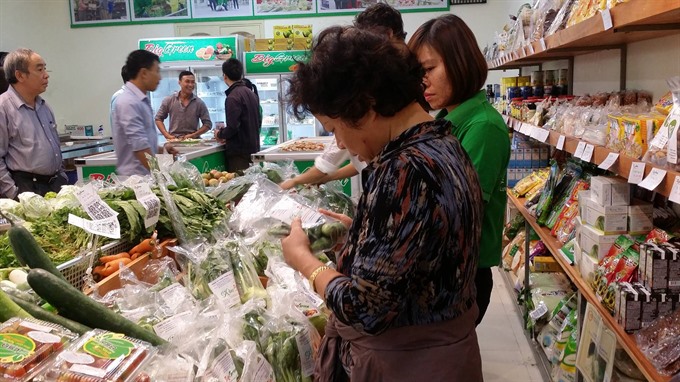Ha Noi will support the development of supply chains in the city, from production to consumption, to control quality, increase value of products, as well as help ensure the benefits of all parties involved.

Ha Noi will support the development of supply chains in the city, from production to consumption, to control quality, increase value of products, as well as help ensure the benefits of all parties involved.
The capital city has developed 80 safe food supply chains, of which 36 are of animal origin and 44 are of plant origin, according to the Ha Noi Department of Agriculture and Rural Development.
Ha Noi is also implementing a pilot programme granting safe-food certificates for 11 production units in the vegetable and meat supply chains, and for 23 food shops.
Ha Noi has over 10 million residents with rising demand for agricultural products. However, the city’s production output meets only 60 per cent of its needs, while many products are dependent on neighbouring localities.
According to estimates, Ha Noi’s rice output provides just 35 per cent of the city’s demand. This number for beef production is 15 per cent, seafood 5 per cent, and processed food 20 per cent.
The area for growing vegetables in the city is currently estimated at over 10,000 hectares, satisfying 66 per cent of consumption demand. For the rest, the city must rely on supply from neighbouring provinces such as Hung Yen, Ha Nam, Bac Ninh and Vinh Phuc.
Twenty-one localities provide safe food for Ha Noi, creating a production and supply chain of agro-forestry-fishery products for the city.
In the first six months of this year, Dien Bien Province provided about 50 tonnes of agro-forestry-fishery products for Ha Noi, while Vinh Phuc supplied 2,500 tonnes of vegetables, three million eggs, 60 tonnes of chicken meat, 500 tonnes of pork and 100 tonnes of fish.
According to the Ha Noi Department of Agriculture and Rural Development, supply chains between Ha Noi and other provinces remain limited. One of the reasons is that some localities have yet to develop annual co-operation plans for each sector.
On the other hand, many provinces do not have specialised agencies or departments in agricultural trade promotion to maintain regular co-operation between enterprises.
At the same time, current policies to attract Ha Noi’s enterprises to invest in processing agricultural products have not been fully developed. Some products sold at chain stores do not have brand names or identification information. The amount of farm produce supplied to Ha Noi through co-ordination remains modest.
Therefore in order to diversify the agricultural products supplied to the capital city, the authority needs to step up coordination with provinces in food quality management and food safety, checking sample quality of their products for traceability.
In particular, Ha Noi should build a mechanism to create favourable conditions for businesses to invest in processing, linking and selling products to farmers, building high-tech agricultural models. – VNS





